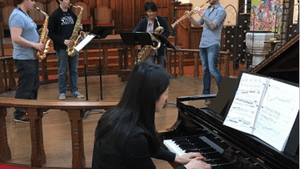Stay in the Loop
BSR publishes on a weekly schedule, with an email newsletter every Wednesday and Thursday morning. There’s no paywall, and subscribing is always free.
A saxfest and a rock apocalypse
Astral Artists and Bach at Seven get saxy

The latest offerings from Astral Artists and Bach at Seven challenged my ability to deal with new types of music. Astral presented a mild challenge — a concert entirely devoted to saxophone music. Bach at Seven confronted me with something more formidable — an oratorio that mixed rock music with a traditional choir and orchestra.
Adolphe Saxe invented the saxophone after the orchestra had already settled into its present state. The saxophone hasn’t won a seat in the orchestra yet but it’s becoming a presence in chamber music. Contemporary composers seem to be attracted to an instrument with its range and timbres.
At Astral’s February concert, saxophonist Jonathan Wintringham participated in two chamber pieces. At this event, he was the main attraction. He played four pieces with pianist Pi-Lin Ni and began each half as the soprano sax of his saxophone ensemble, the East End Quartet.
Composers tended to exploit the saxophone’s associations with jazz when they first started experimenting with the instrument, but you didn’t hear any of that connection in the pieces on this program. When the quartet launched into the opening selection from Astor Piazolla’s Las Cuatro Estaciones Porteñas, it sounded like a village band cheerfully initiating a holiday. At other times, the four instruments sounded like a full size brass band.
All the pieces on the program had their slow interludes but they never echoed Summertime or the gin mill melancholy of the blues. The composers experimented with the instrument’s possibilities and created the kind of virtuoso technical challenges they put into star turns for other instruments.
I would have been happier if the proceedings had included more of the instrumental variety Astral packed into Wintringham’s February appearance. In that program, he interacted with the violin, the viola, the cello, and the harp, in addition to the piano. The saxophone is, to my taste, at its best when its distinctive voice is teamed with other instruments.
The director of Bach at Seven, Matthew Glandorf, programmed Andrew Lipke’s end-of-the-world oratorio, The Plague, with a Bach cantata about war in Heaven. The Bach begins with a bustling description of the war and spends most of its length describing the peaceful aftermath that follows St. Michael’s defeat of Satan. The Plague dramatizes the events evangelical Christians call the Rapture — the end of mankind, with the saved pulled up to heaven and everyone else left behind.
In keeping with the great journalistic ethic of full disclosure, I should advise BSR readers I have developed a bias against rock music. I become homicidally enraged when anything is forced on me and people have been forcing me to listen to rock music for 50 years.
The Plague’s rock element was supplied by its composer. Lipke played guitar while he sang in a twangy, pseudo-rural, vaguely Southern accent that seems to be one of rock’s standard affectations. The guitar was amplified, but Lipke didn’t try to create the empty excitements of a wall-hammering big beat. He sang from the back of the stage area and applied a restrained amplification that pushed the guitar through the chorus and orchestra in front of him.
Lipke’s choral and orchestral writing was actually quite effective. The cello sounded melodramatic in one section, for example, but it was successfully melodramatic.
My main problem with The Plague is the same problem I have with Bach’s cantatas. I don’t share the beliefs expressed in the text. With Bach, I have to work around all those passages in which he tells us we should look forward to death and the great moment when we will leave the pains of life and enter Paradise. In Lipke’s oratorio, I have to cope with an apocalyptic vision I don’t believe in and don’t find very interesting. In the 65 years I’ve been reading science fiction, I’ve read a number of world-wrecking final-disaster stories that are far more imaginative and compelling.
The Plague works as well as it does, I think, because Lipke has chosen a theme that suits the emotional range of rock music. If you want to wail about the end of the world, rock offers a suitable medium.
What, When, Where
Astral Artists: Piazzolla/Wintringham/Boothroyd, Las Cuatro Estaciones Porteñas. Demersseman, Fantaisie sur un thème original. Albright, Sonata. Desenclos, Prélude, Cadence, et Finale. Yoshimatsu, Fuzzy Bird Sonata. Jonathan Wintringham, saxophones (Philadelphia debut, rescheduled from January 22). Pi-Lin Ni piano. East End Quartet saxophone quartet. May 8, 2016 at Trinity Center for Urban Life, 2212 Spruce Street, Philadelphia www.astralartists.org or (215) 735-6999
Bach Festival of Philadelphia, Bach at Seven: Bach Cantata BWV 19 Es erhub sich ein Streit. Lipke, The Plague: An oratorio (World Premiere) Choral Arts Philadelphia chorus. Philadelphia Bach Collegium orchestra. Matthew Glandorf conductor. May 4, 2016 at St. Clement's Church, 20th and Cherry Streets, Philadelphia. www.choralarts.com or (267) 240-2586
Sign up for our newsletter
All of the week's new articles, all in one place. Sign up for the free weekly BSR newsletters, and don't miss a conversation.

 Tom Purdom
Tom Purdom